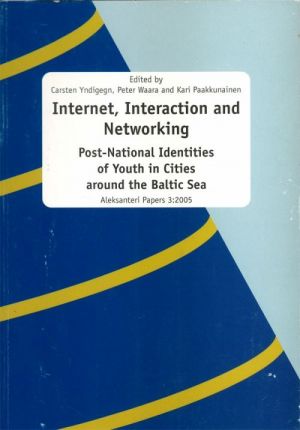There are great expectations concerning new communication technologies and the Internet. A revolution in people's networking and globalisation is spoken of. Especially young people's Internet use is in the spot light here. Rarely, however, have supra-national interaction, networking and the new cultural identities being formed thereby been studied in an empirical and comparative way. In the five studies in this book, young people's post-national interaction and identities are analysed on the basis of a common set of survey data, gathered among 16-18-year-olds in the regions surrounding St. Petersburg, Tallinn, Copenhagen, Stockholm and Helsinki. In the survey questions, besides asking these young people what they thought about using the Net, factors concerning their European and Baltic Sea regional identities were investigated, as well as the problems of multi-culturalism and the risk society. The different researchers' articles here are excitingly different from each other, commenting on the supra-national networks and identities of young people around the Baltic Sea on the basis of many different theoretical traditions.
According to the research here, some of the young people interviewed have Baltic Sea based interests and identities, but overall activities built up around the Internet do not follow the geographical borders of the region. In this respect also, the Net operates without the limitations of physical space. Young people have new sorts of international contact networks, and in many respects their societal contemplation internationalises and identities blend together. Well educated elite young people from cultured homes have their post-national forums, and they are aware of the global communication connections and solutions required in terms of ecology and the risk society. Post-nationalism, however, only describes the strong orientation of a portion of these young people. Another group see their position as uncertain, and take refuge in only familiar and durable communal values and national contacts on the Net as well. On the other hand, national customs are reflected in different ways in the Internet use of all the young people surveyed. Though nationalism is being tested by new international values and contacts, it "strikes back at times" and affects new identities. Young people can have many identities, ranging from local and national to global. Nation-states as well are becoming more open and are considering issues in a more international fashion.
There are great expectations concerning new communication technologies and the Internet. A revolution in people's networking and globalisation is spoken of. Especially young people's Internet use is in the spot light here. Rarely, however, have supra-national interaction, networking and the new cultural identities being formed thereby been studied in an empirical and comparative way. In the five studies in this book, young people's post-national interaction and identities are analysed on the basis of a common set of survey data, gathered among 16-18-year-olds in the regions surrounding St. Petersburg, Tallinn, Copenhagen, Stockholm and Helsinki. In the survey questions, besides asking these young people what they thought about using the Net, factors concerning their European and Baltic Sea regional identities were investigated, as well as the problems of multi-culturalism and the risk society. The different researchers' articles here are excitingly different from each other, commenting on the supra-national networks and identities of young people around the Baltic Sea on the basis of many different theoretical traditions.
According to the research here, some of the young people interviewed have Baltic Sea based interests and identities, but overall activities built up around the Internet do not follow the geographical borders of the region. In this respect also, the Net operates without the limitations of physical space. Young people have new sorts of international contact networks, and in many respects their societal contemplation internationalises and identities blend together. Well educated elite young people from cultured homes have their post-national forums, and they are aware of the global communication connections and solutions required in terms of ecology and the risk society. Post-nationalism, however, only describes the strong orientation of a portion of these young people. Another group see their position as uncertain, and take refuge in only familiar and durable communal values and national contacts on the Net as well. On the other hand, national customs are reflected in different ways in the Internet use of all the young people surveyed. Though nationalism is being tested by new international values and contacts, it "strikes back at times" and affects new identities. Young people can have many identities, ranging from local and national to global. Nation-states as well are becoming more open and are considering issues in a more international fashion.












